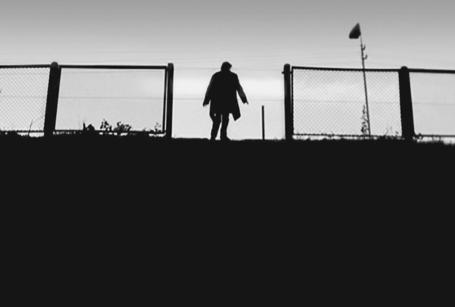Shadows at the periphery of 21st century Europe in Fred Kelemen’s “Fallen”
Now in its second week at Anthology, the new film “Fallen” plunges the viewer into a bath of astringent anomie certain to rinse away the cloying holiday goo. Fabulously bleak and defiantly old-school, this rewarding low-key mystery should not be overlooked.
“Fallen” is the fourth feature by the visionary German director Fred Kelemen, widely acclaimed for his earlier “Fate” (1994), “Frost” (1997), and “Nightfall” (1999), yet little known in the U.S. despite recognition by the late Susan Sontag. A self-proclaimed acolyte of the Hungarian miserablist master Béla Tarr, Kelemen issued a “declaration of solidarity” last March when the untimely death of producer Humbert Balsan left Tarr’s feature in-progress, “The Man From London,” suddenly unmoored.
But Kelemen is no mere epigone. Though he clearly draws inspiration from Tarr’s intricately choreographed long takes and unrelieved gloom, Kelemen’s work has its own concentrated power. A seasoned educator as well as artist, Kelemen was on a teaching stint at the Latvian Culture Academy in Riga when the inspiration for “Fallen” seized him. Writing, directing, and photographing the modestly scaled project himself, Kelemen collaborated with an ensemble of Latvian theater actors, all of them wonderful.
One silvery evening, the solitary Matiss (Egons Dombrovskis), Kelemen’s version of the Man Without Qualities, is crossing a bridge in Riga, enveloped by the musique concrète of susurrant trees and far-off industry. Halfway across, he slows and pauses at the uncanny figure of a youthful blonde (Aija Dzerve) perched on the wrong side of the railings. She turns to face him, wearing an inscrutably blank expression. Seagulls’ cries rake the soundtrack, and she turns back to face the night.
Hesitantly, silently, he walks on, but reaching the far end, hears a loud splash and cry for help. Racing back to the spot, Matiss peers out into a dim void, no further trace of the woman. Perturbed, he walks back to the far side of the bridge and, framed by the cage of its iron balusters, makes for a nearby phone booth—this entire introduction staged in a single continuous shot. Presently the fuzz arrives, and the film takes an absurdist detour as Matiss is harangued by a jaundiced detective (Vigo Roga) in the backseat of his car.
Matiss then appears in his diurnal guise, as a functionary at work in the stacks of the Latvian national archives. The building’s anonymous interiors, the numberless files, Matiss’ drab attire, and his co-workers’ impassivity all reinforce an evocation of monumental bureaucracy and the total administration of everyday life. Interrupting this featureless, metronomic routine, his encounter with the presumed suicide kindles a guilt-stained curiosity that soon quickens into obsession.
Returning to the bridge the next day, he regards the peacefully eddying stream while in the background a gaggle of bathers splashes in the shallow water. Posing as the woman’s boyfriend, he retrieves her handbag, and some discarded letters addressed to a certain Alexej, from the circumspect bartender (Gundars Silakaktin) at a nearby pub.
Providentially the handbag contains a claim stub for a set of still photos, and when Matiss collects these, “Fallen” shifts self-consciously into an homage to Antonioni’s “Blow-Up” (1966). Projecting the transparencies onto the wall of his flat, Matiss begins to infer a romantic betrayal and seething jealously in snapshots of the woman first with one, then two male companions. Part of Kelemen’s irony is that these images are more expressive in their silence than the zero-degree performances of his cast.
Matiss tracks down the mysterious addressee to a back-alley warren, ostensibly to return the purse he found in the street. Alexej (Nikolaj Korobov) is at first suspicious and curt, but distress over his missing lover overcomes him, and he divulges their affair to Matiss, who by that point is treading a shadowland of near-derangement. The film builds to an unexpected climax, and stays true to Antonioni’s insistence on our susceptibility to the illusory dimension of images.
“Fallen” gains much of its resonance and pungency from its setting on the periphery of 21st-century Europe. The Baltic port’s decaying façades and woebegone atmosphere make a stark contrast to the familiar, polished European metropolis of media currency, even as Kelemen’s rough-hewn monochrome cinematography and old-fashioned Academy ratio format recall the vintage postwar European art cinema. With each film, Kelemen continues to prove himself an admirable successor to that legacy.
gaycitynews.com


































